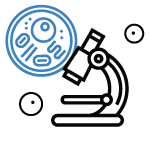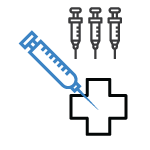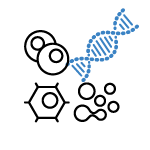Maintenance of scientific and research equipment/research station called: Laboratory for Cell Research and Application
The project concerns the maintenance of scientific and research equipment/research station in the years 2024 - 2026, is financed by the Ministry of Science and Higher Education.
The goal of the project
The goal is to maintain the infrastructure of the Laboratory for Cell Research and Application of the Medical University of Warsaw, which includes the areas: production of advanced therapy medicinal products ATMP (Pharmaceutical Factory), the Tissue and Cell Bank (BTiK), validation facilities and the Biobank.
Laboratory for Cell Research and Application is located in the Center for Preclinical Research. As a university-wide unit of the Medical University of Warsaw, it provides the University's infrastructural support for the development, research and production of innovative ATMP (advanced therapy medicinal products) containing live cells and/or their derivatives.
Financing institution:
Ministry of Science and Higher Education.
Duration of the project
24.09.2024 r. do 31.12.2026
Value of the grant
4 242 821,51 zł
Chief Project Manager
Dr n. med. inż. Ilona Szabłowska-Gadomska: ilona.szablowska-gadomska@wum.edu.pl
The impact of the osteogenic differentiation process and environmental conditions on the immunomodulatory profile of ADSC cells
Dr. Ilona Szabłowska-Gadomska, an employee of the Laboratory for Cell Research and Application, will investigate the impact of the osteogenic differentiation process on changes in the protein profile of ADSC cells (Adipose Derived Stem Cells/Stromal Cells isolated from adipose tissue) and their secretome. Results of the co-financed project entitled "The impact of the osteogenic differentiation process and environmental conditions on the immunomodulatory profile of ADSC cells" may in the future contribute to a better understanding of the role of these cells in the body in physiological and pathological conditions, as well as a more safe and effective use in the clinic.
ADSC cells are located in adipose tissue. They can play a significant role in the development, and maintenance of tissue homeostasis, repair, and regeneration. Due to their abundance and relatively easy availability, the ability to multiply in vitro, and, above all, their immunomodulatory potential, they are a valuable tool in regenerative medicine. Substances secreted by ADSCs influence the functions of immune system cells and exert a strong immunosuppressive effect, constituting a specific "immunomodulation mediator".
The research will be carried out as part of the grant application submitted in the MINIATURA 7 competition for scientific activities, organized by the National Science Center.
FootCell
The project was funded by the Medical Research Agency under the competition for non-commercial clinical trials in the area of civilization diseases ABM/2021/3.
Evaluation of the safety and effectiveness of an advanced therapy medicinal product containing live ASC cells in the treatment of diabetic foot syndrome - a double-blind, randomized study (Acronym: FootCell)
The aim of the project is to evaluate safety and efficacy of an advanced therapy medicinal product, containing allogeneic mesenchymal cells derived from adipose tissue as the active substance (ATMP-ASC) - for the treatment of Diabetic Foot Syndrome.
The study is based on the preliminary results obtained by the Laboratory for Cell Research and Apllication of the Medical University of Warsaw and the Department of Diabetology and Internal Diseases of the UCK Medical University of Warsaw, as part of a pilot treatment experiment, where a preparation of this type was administered in an open, i.e. unblinded, observation without randomization.
ABCtherapy
Project implemented as part of the Strategmed program, organized by the National Center for Research and Development (NCBR)
Therapeutic potential of adipose-derived stem cells, proven in clinical trials and examined in vitro - rationale for banking of well characterized cells
A multidisciplinary team conducts clinical trials aimed at assessing the safety and effectiveness of therapy with the use of autologous stem cells isolated from the patient's adipose tissue in the treatment of:
- difficult to heal wounds in the diabetic foot syndrome,
- treatment of scars and damage to the elastic skin.
The biological material obtained in the study is used to carry out in vitro experimental observations to increase the therapeutic potential of cells obtained from adipose tissue. In particular, observations are carried out on the differentiation of these cells into different immunophenotypes, their immunological characteristics - in the context of therapy in the allogeneic system, transcriptomic and epigenetic characteristics using new generation sequencing methods.
BBMRI.pl
Project financed by the Ministry of Science and Higher Education (decision No. DIR/WK/2017/2018/01-1)
Establishment of a biobank network in Poland within the Research Infrastructure of BBMRI-ERIC Biobanks and Biomolecular Resources
The main goal of the research project is to create a Polish Biobanking Network (PBN) within the BBMRI-ERIC Biomolecular Research Infrastructure for Research. The basic assumption of PBN is to bring as many entities as possible to collect biological material and provide them with substantive support in developing their biobanks / repositories.
The Medical University of Warsaw is responsible for the implementation of task 1: "Identification and characteristics of entities interested in joining the Polish Biobanking Network" and is a co-organizer of task 5: "Introduction of a uniform quality control system for all stages of the national biobanks functioning".
Exploreme
Project implemented as part of the Strategmed program, organized by the National Center for Research and Development (NCBR)
Exploitation of regenerative potential of mesenchymal stem cells
The aim of this project is to direct the differentiation of mesenchymal stem cells in the bone and cartilage direction in order to accelerate the healing and rehabilitation of patients after orthopedic, dental and neurological operations.
GLIOMED
Project implemented as part of the Strategmed program, organized by the National Center for Research and Development (NCBR)
Diagnostics of gliomas based on circulating cell free tumor DNA
We are working on the development of a liquid biopsy-type method based on tumor free-circulating DNA (cfDNA) in blood, which could be a quick and minimally invasive alternative to biopsy. The additional aims of the study are: comprehensive molecular characteristics of tumor genome and transcriptome as well as use of 3D in vitro glioma cultures, i.a., under hypoxic conditions for screening of the content of stem cells and assessment of cells susceptibility to therapy in the environment of neoplastic niche.






